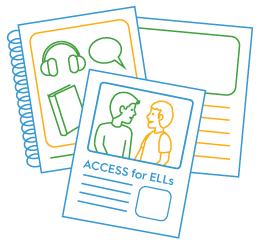Resources/Recursos
Featured Resources



All resources/Todos los recursos
Filter resources by:
Resources/Recursos
A Framework for Understanding English Learners With Disabilities: Triple the Work
This ALTELLA Research Brief explains the Language and Disability Needs Framework. The brief focuses on considerations of students’ language-related and disability-related needs and their implications for instruction and assessment.
Resource DetailsReleased September 2025
The Role of Language and Communication in the Education of English Learners With Significant Cognitive Disabilities
Use this ALTELLA Research Brief to distinguish between language and communication. The brief covers how multilingual learners with significant cognitive disabilities use both language and communication.
Resource DetailsReleased September 2025
ALTELLA Project Individual Characteristics Questionnaire
This Individual Characteristics Questionnaire was developed in 2018 by the ALTELLA project. Anyone can use the ALTELLA Individual Characteristics Questionnaire (fillable PDF) to collect characteristic information on a multilingual learner with a disability.
Note: A slightly different Individual Characteristics Questionnaire is part of the WIDA Alternate ACCESS test materials.
Resource Details View Download NowReleased September 2025
Classroom Observation Protocol
Administrators can use this ALTELLA protocol (fillable PDF) to learn more about the instructional strategies teachers are using with the multilingual learners with disabilities in their classrooms.
Resource Details View Download NowReleased September 2025
Teacher Interview Protocol
Administrators can use this ALTELLA protocol (fillable PDF) to learn more about the instructional strategies teachers are using with the multilingual learners with disabilities in their classrooms.
Resource Details View Download NowReleased September 2025
Considerations for Educators Serving English Learners With Significant Cognitive Disabilities
Use this ALTELLA Research Brief as a step-by-step guide on how to best serve multilingual learners with significant cognitive disabilities more effectively.
Resource DetailsReleased September 2025
Characteristics of English Learners With Significant Cognitive Disabilities: Findings from the Individual Characteristics Questionnaire
This ALTELLA report examines pilot findings from the ALTELLA Individual Characteristics Questionnaire, which surveyed educators about their students. The report explores survey information that may be useful to states in developing accountability policies, alternate academic achievement standards, and other state policies and guidance materials.
Resource Details View Download NowReleased August 2025
Classroom Perspectives on English Learners With Significant Cognitive Disabilities
This ALTELLA report highlights findings from 88 classroom observations and 94 follow-up interviews with educators of these classes. These findings shed light on the classroom practices used to support the English language development of students who are dually identified as English learners and students with significant cognitive disabilities.
Resource Details View Download NowReleased August 2025
What Is WIDA Alternate Screener? (multiple languages)
Use this handout in intake centers or at parent-teacher conferences to help explain what WIDA Alternate Screener is and the process of screening students with the most significant cognitive disabilities and identifying them as English learners. This family handout, available in multiple languages, includes a section for families to take notes and ask questions about English language services.
Resource DetailsReleased June 2025
Tell Us About Your Child Survey
The Tell Us About Your Child Survey is a questionnaire that educators can give to families or caregivers of multilingual learners with the most significant cognitive disabilities to better understand a student's language and communication needs. In the survey, families or caregivers will answer questions about a student’s method of communication and language, their ability to understand communication and their preferred communication supports.
Resource DetailsReleased May 2025
Alternate Can Do Descriptors
The Alternate Can Do Descriptors (Alt Can Dos) are the first-ever Can Do Descriptors for multilingual learners with the most significant cognitive disabilities. The Alt Can Dos exemplify what students can do with communication and language at various stages of English language development.
The Alt Can Dos are arranged into the same grade-level clusters (K–2, 3–5, 6–8 and 9–12) as WIDA Alternate ACCESS. Within each grade-level cluster, the Alt Can Dos are organized by interpretive (listening and reading) and expressive (speaking and writing) communication modes for each WIDA ELD Standard and the five levels of English language development.
Resource Details View Download NowReleased October 2024
Detection of Multiple Group Differential Item Functioning for Students With Disabilities of the Alternate ACCESS Field Tests in 2023
This report describe how WIDA applied Differential Item Functioning analysis among multiple disability groups of our Alternate ACCESS Field Test items in 2023.
Resource Details View Download NowReleased December 2023
Identifying Multilingual Learners With Specific Learning Disabilities: Data, Advice and Resources for School Teams
This Focus Bulletin offers expert advice, data on 2020-21 identification rates, data templates, common scenarios and resources for school teams identifying K-12 multilingual learners for Specific Learning Disabilities.
Originally published May 2017/Updated November 2023
Author: Lynn Shafer Willner
Released December 2023
Alternate Proficiency Level Descriptors
The Alternate Proficiency Level Descriptors (Alternate PLDs) are an extension of the PLDs found in the WIDA English Language Development (ELD) Standards, 2020 Edition, and describe the continuum of language development for ELs with the most significant cognitive disabilities. The Alternate PLDs are organized into five levels of English language proficiency for two communication modes: interpretive and expressive. Refer to the Glossary and Text Examples section for definitions of terms and examples of student responses. WIDA, with the help of classroom educators, created these proficiency levels to be unique to WIDA Alternate ACCESS.
Resource Details View Download NowReleased August 2023
Generating Imputed Overall Composite Scale Scores for English Learners With Disabilities Who Are Missing Domain Scores in the ACCESS for ELLs Assessment
This technical report aids WIDA Consortium members and stakeholders in producing imputed overall composite scale scores and proficiency levels for students who are missing scores in one or two domains due to a disability.
Published September 2020
Author: Narek Sahakyan
Released September 2020
Investigating K-12 English Learners' Use of Universal Tools Embedded in Online Language Assessments
This study examined how English learners in grades 1-12, with and without disabilities, used online accessibility features during an ELP assessment. These accessibility features are designed to provide the necessary support for the general EL population, including ELs with disabilities.
Published March 2019
Authors: Ahyoung Alicia Kim, Meltem Yumsek, Mark Chapman, H. Gary Cook
Released March 2019
Developing Item Templates for Alternate Assessments of English Language Proficiency
This ALTELLA Report explores how item and task development – a critical component of assessment design – might be implemented for an alternate assessment of English language proficiency standards.
Resource Details View Download NowReleased October 2018
Providing ELLs With Disabilities Access to Complex Language
This WIDA Focus Bulletin outlines ways in which educators can provide English Language Learners with disabilities access to complex language via classroom activities and engagement opportunities.
Published March 2017
Authors: Lynn Shafer Willner, Cynthia Lundgren, Mira Monroe, Julia Cortada
Released February 2017
Examining Relationships Between Alternate Access and State Alternate Assessments
This report examines how Alternate ACCESS for ELLs serves as a tool that identifies English proficiency attainment for English learners with significant cognitive disabilities.
Published December 2014
Author: H. Gary Cook
Released December 2014




